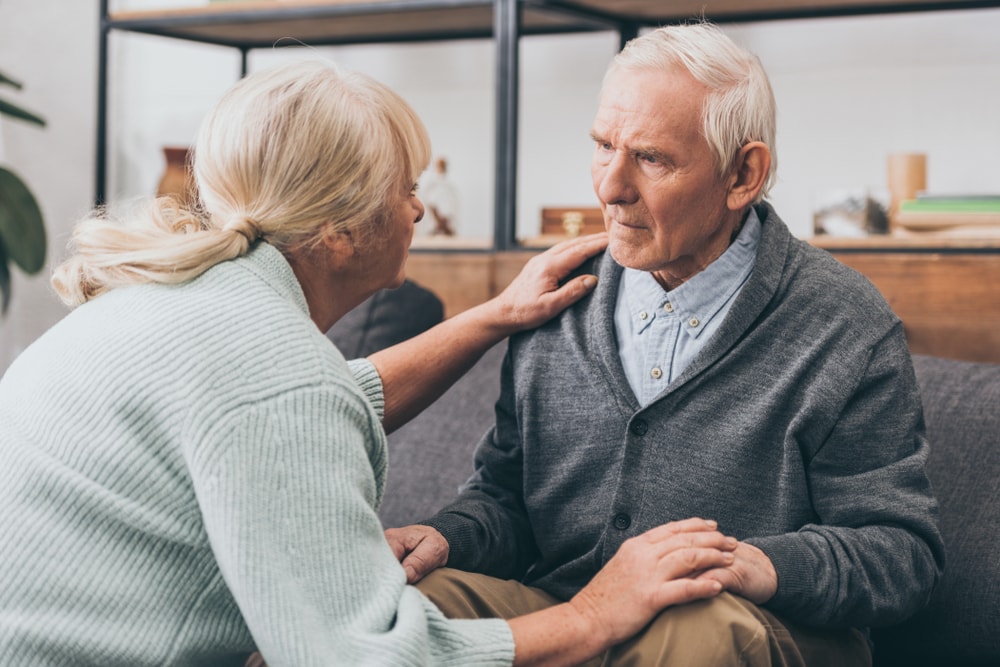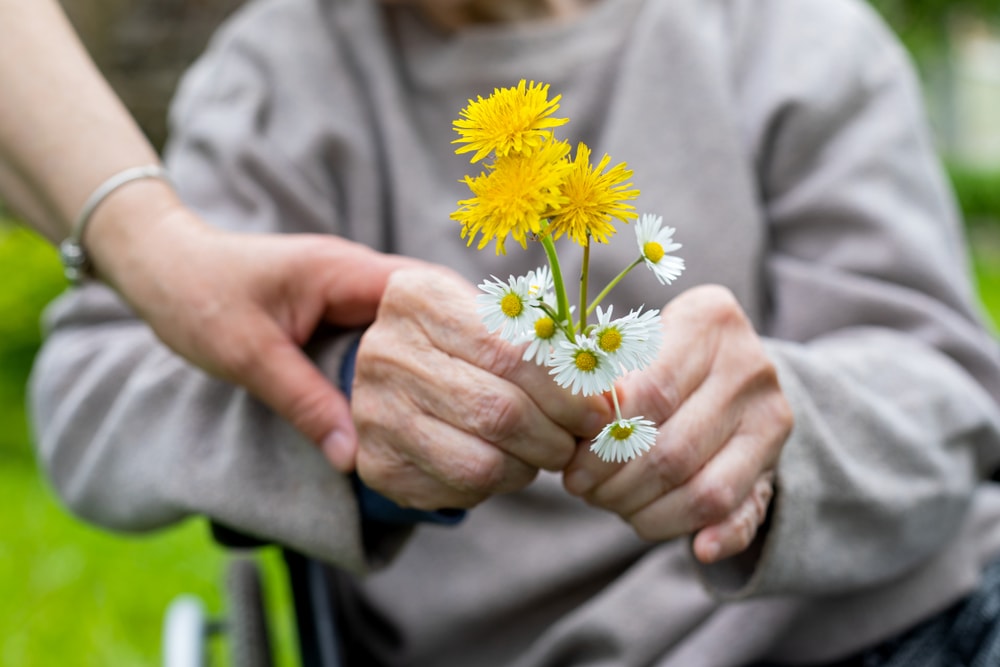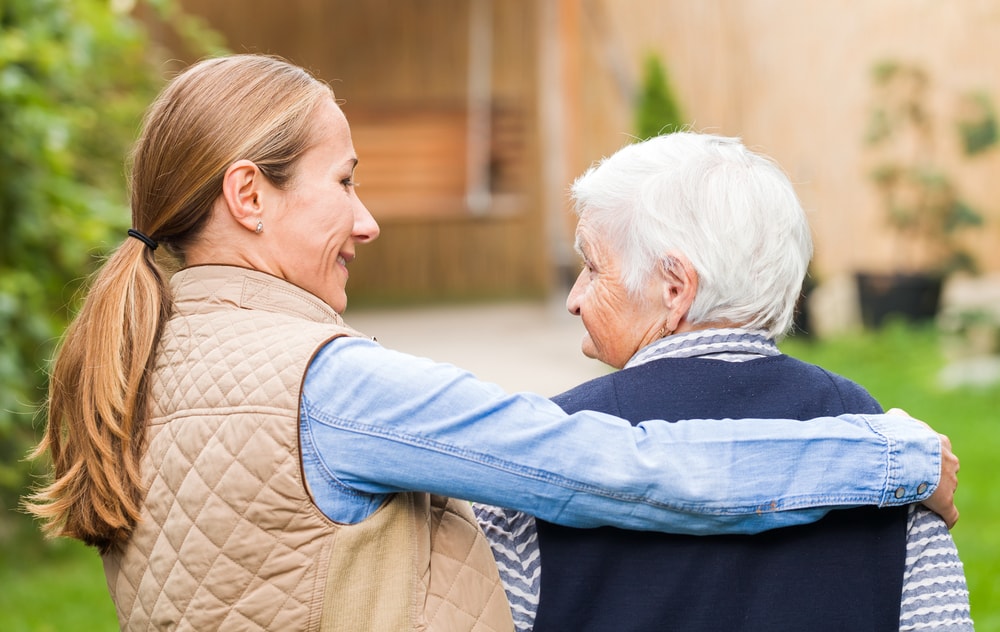If you are caring for a loved one with dementia, the grief journey for both of you will be a little more complicated. It may be that you’ve lost a mother, but your father, who suffers from dementia, has lost a wife. How do you navigate him through his loss – a loss that he may not always remember – while also walking down the road of grief yourself?
Dr. Alan Wolfelt, a nationally respected grief counselor, author, and educator, has helped many families navigate the difficult journey through grief over the years. Because of his extensive background in helping families, he has identified key ways you can help someone with dementia mourn a loss. These helpful tips will empower you to help your loved one with dementia while also allowing you to grieve your own loss.

Dr. Wolfelt states: “For people with dementia, the grieving process grows more complicated. Their brains, the traffic control centers for thoughts and emotions, literally become clogged, creating dead ends, jams and crashes. Grief is a physical, cognitive, emotional, social and spiritual journey, yet the brain is where all those aspects of the self originate and traverse. Grief is always difficult, but when someone’s brain is no longer working well, it is even more challenging, both for the person with memory loss and for his or her family and caregivers.”
5 Tips for Helping a Person with Dementia Grieve
1. Interact with Empathy
Every person’s journey with dementia is different. As you help someone with dementia grieve, remember that their cognitive and physical condition, their personality, as well as the circumstances surrounding the loss will all factor into the process. That’s why it’s important to operate in empathy.
It is easy to become frustrated or stressed when caring for a person with dementia, but what they really need is your compassion, your kindness, and your willingness to try to understand reality from their perspective. Don’t worry about trying to say the “right” words – your empathetic presence and your support are more important than any specific words you may say.
2. Realize that They May Mourn Differently
Through his experience helping thousands of people through the grief process, Dr. Wolfelt has identified six needs of mourning: 1) acknowledge the reality of the loss, 2) feel the pain of the loss, 3) remember the person who has died, 4) develop a new self-identity, 5) search for meaning, and 6) receive ongoing support from others.
Now, in many cases, a person with dementia is no longer capable of addressing these six needs on their own. That’s where you – their caregiver and loved one – come in. For example, they may not always remember that someone has died, but in certain moments, they may recall it perfectly. When those moments of clarity come, allow the person with dementia to talk about the loss and share their memories, even if they are sharing those memories for the hundredth time.
Any expression of their inner thoughts and feelings is good and helpful, though it may be difficult for you to see. They may exhibit delayed reactions or sudden emotional outbursts. If this happens, try to remain calm. These reactions may be the only way they can express what’s happening on the inside, so witness their emotions and accept them. Above all, actively listen and affirm your loved one with dementia. This is how you can show your support.
3. Include Them in the Funeral Ritual
Whether you have a funeral or memorial service, a graveside service or a scattering of ashes, don’t be afraid to include the person with dementia in these symbolic events. If it’s appropriate, you can even include them in the funeral planning process. Tell them what choices are being made. Encourage them to share any memories they may recall and consider incorporating them into the service. Additionally, while the person with dementia may not remember attending the visitation, service, or gathering, the familiar rituals can offer comfort and support. Consider asking a family friend to sit beside the person with dementia during the funeral events so that immediate family members can focus on their own grief.
On the other hand, if the person with dementia is unable to attend any of the funeral events, there are other options available to help them understand the reality of the death and work through their grief. For example, you can arrange a private viewing. Or, schedule a short service at a place where the person with dementia can attend (their own home or an assisted living facility). You could also take the person with dementia to the cemetery, columbarium, or other final resting place. The more you include them, the more likely they are to retain the knowledge that a loved one has died and can grieve for that loss.
4. Pay Attention to Their Feelings
Because long-term memory is the last to be affected by dementia, your loved one may act as if the person who has died is still alive. When this happens, it’s okay. Consider it part of their memory at work and actively join them in reminiscing. In some moments, they will be completely lucid. In these moments, try to discern any emotions they may be feeling inside and compassionately name them. For instance, “It looks like you may be feeling….” This is a form of empathy and will help them feel understood and cared for.
5. Incorporate Practical Tools
There are intentional acts you can do to help a loved one with dementia through the grieving process. For instance, introduce items that belonged to the person who has died. Allow the person with dementia to handle the items. If their response is comforting, leave the object. However, if they react negatively, remove it and try another one.
Other practical tools are:
- creating a display of photos they can look at and interact with
- using the past tense when referring to the person who has died
- recounting stories that may trigger memories
- listening to music associated with special memories of the person who has died
By including these practices, you help your loved one with dementia do the work of grief.
Helping Them Helps You
Helping a loved one with dementia grieve will not be easy, but it is beneficial. Dr. Wolfelt believes: “Patience, honesty, and, most of all, empathy and love are the keys to helping a person with dementia after someone loved dies. Always remember that though dementia may destroy a brain, it cannot destroy a soul. The soul is where love and grief live, and any efforts you undertake to help the person express what is in their heart and soul will honor what has been most meaningful in their life.”
And while helping a person with dementia grieve may seem like a daunting task – something that takes away from your own ability to grieve – remember that as you help them grieve, you will also do the work of grief. Talking to a person with dementia about the reality of the loss will help you accept it yourself. Sharing memories about the person who has died will help you remember them, too. Witnessing the painful emotions your loved one with dementia may exhibit will help you to face your own pain at the loss. And so on.
Grief is the natural consequence of love. It is exhausting, physically and emotionally. But thankfully, there is no time frame and no deadline for “getting over” a loss. In fact, it’s not about “getting over” a loss – it’s about finding a way to move forward. And that takes time. So, as you help a loved one with dementia process a loss (and as you process your own feelings of loss), don’t feel pressured by an imaginary timeline. Instead, breathe deeply and take the time you need. There’s no rush.
*Source: Supporting Mourners with Dementia, Dr. Alan Wolfelt, August 2019








